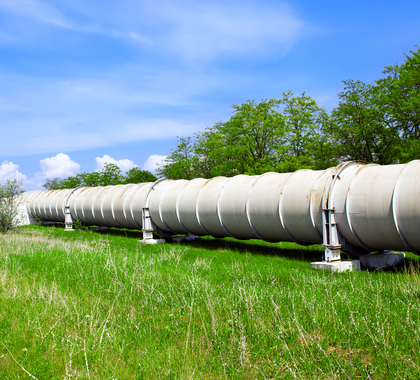Concerned increasingly violent protests against the construction of new oil and natural gas pipelines pose a threat to public safety, lawmakers in eight states have introduced bills designed to deter protestors from damaging property, injuring bystanders, and blocking traffic.
Bills limiting actions protestors can take have been introduced in Colorado, Iowa, Michigan, Minnesota, Missouri, North Dakota, Virginia, and Washington State.
In Colorado, state Sen. Jerry Sonnenberg (R-Sterling) sponsored a bill to make it a Class 6 felony to obstruct or tamper with oil and gas equipment. Currently, those accused of committing such acts in Colorado are charged with misdemeanors and, if convicted, face relatively mild punishments. A Class 6 felony in Colorado is punishable by up to 18 months behind bars and a fine of up to $100,000.
Anti-pipeline demonstrators, operating under the slogan “keep it in the ground,” have in recent months targeted, including using acts of vandalism, TransCanada’s Keystone XL Pipeline, Energy Transfer Partners’ Dakota Access Pipeline in North Dakota, Enbridge Energy Partners’ Sandpiper Pipeline in Minnesota, and Kinder Morgan’s Trans Mountain Pipeline in Washington State.
Public Safety Concerns
Sonnenberg says he wrote the bill out of concern for public safety.
“This is about public safety,” Sonnenberg told Environment & Energy News on January 21. “My fear is that if these people continue to vandalize and change pipeline pressures, we will have a catastrophic event in the communities they are trying to protect.”
The bill doesn’t specifically mention protestors. It states it applies to anyone who “attempts to alter, obstruct, interrupt, or interfere with the action of any equipment used or associated with oil or gas gathering operations,” which covers many of the actions carried out by the pipeline protestors.
The sometimes-violent protests against the Dakota Access Pipeline have unleashed a flurry of state-level bills to impose or increase penalties on violent protests. Many of those protesting against the Dakota Access Pipeline have worn facemasks to hide their identities in clashes with police. In response, one of the bills introduced in the North Dakota legislature would make it a crime for demonstrators to wear masks.
A similar bill introduced in Missouri would make it a Class A misdemeanor for anyone taking part in an “unlawful assembly” to conceal “his or her identity by the means of a robe, mask, or other disguise.” Anyone caught violating the law could face up to one year in jail.
Protesters in North Dakota have blocked highways, putting themselves in the path of vehicles. A bill considered this year in the North Dakota House would have exempted drivers from liability if they unintentionally killed or injured a pedestrian obstructing a highway or public road. The bill was rejected by a vote of 51–40 on February 13.
Bills proposed in Iowa and Minnesota would stiffen fines and impose jail time on protestors who block traffic.
A bill offered by Washington State Sen. Doug Ericksen (R-Ferndale) would classify protests that cause economic damage or disrupt transportation or commerce as “economic terrorism,” a Class C felony.
When he introduced the bill, Ericksen, whose district includes oil refineries, said he’s trying to halt protests that block oil trains and other lawful commerce.
Protecting Lives, Property
Some of those protesting the Dakota Access Pipeline have resorted to violence and property damage, having set vehicles on fire, killed livestock, and engaged in various acts of vandalism. After these offenses, they retreated to nearby land controlled by the U.S. Army Corps of Engineers, where local law enforcement lacked the authority to arrest them.
When leaders of the National Sheriffs’ Association met with President Donald Trump on February 8, they asked him for federal assistance in dealing with the explosive situation in Morton County, North Dakota. At press time, officials were still considering the request.
On February 8, the Trump administration’s Army Corps of Engineers reversed the Obama administration’s permit retraction and approved construction of the final 1,100 feet of the Dakota Access Pipeline.
Protestors Trashed Environment
Former North Dakota state legislator Bette Grande, a research fellow for energy policy at The Heartland Institute, which publishes Environment & Climate News, says she was appalled by the mountains of trash Dakota Access Pipeline protestors left in their wake.
“The Dakota Access Pipeline already crosses under the Missouri River at Williston, North Dakota, so this is not about protecting water quality,” said Grande. “The irony is the vast majority of protestors who came from outside North Dakota to disrupt, riot, and cause damage to the pipeline caused greater environmental damage than any threatened by the pipeline.
“After the protestors were asked to leave by tribal leaders, they left behind an environmental disaster in the form of mountains of trash, burned-out cars, and human waste on the flood plain next to the river,” Grande said. “As a result, the tribe and state and federal taxpayers have been forced to clean up an environmental disaster created by protestors.”
Craig Rucker, executive director of the Committee for a Constructive Tomorrow, warns the pipeline protests set the stage for even more violent protests in the future.
“Now that the template for violent protests against pipelines has been created, we could be in for more of the same in North Dakota and elsewhere,” said Rucker. “Sooner or later, people are going to suffer bodily harm from reckless activists who would have everyone believe they really want a better world.”
Bonner R. Cohen, Ph.D. ([email protected]) is a senior fellow at the National Center for Public Policy Research.





